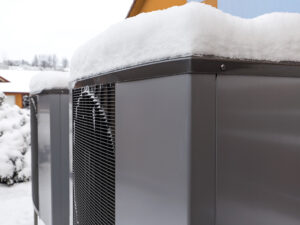What to Do if Your Outside AC Unit Is Frozen During the Winter
 Since winters in New Jersey often consist of freezing temperatures and snowy weather, homeowners in the area usually favor their heaters over their air conditioners. Even with the frigid temperatures, the outside portion of the air conditioner has protection against freezing. However, if you discover your outside AC unit is frozen, you have a serious problem.
Since winters in New Jersey often consist of freezing temperatures and snowy weather, homeowners in the area usually favor their heaters over their air conditioners. Even with the frigid temperatures, the outside portion of the air conditioner has protection against freezing. However, if you discover your outside AC unit is frozen, you have a serious problem.
It’s reasonable to assume that a frozen AC unit is due to cold weather, but the reality is likely more complicated. If you need AC services in Burlington by Davis Home Service, our team can quickly identify and address your air conditioning needs. As a top-rated HVAC company proudly serving the area, we provide 24/7 emergency services with satisfaction guaranteed.
Consider the guide below to learn what you can do if your AC unit is frozen and why the problem occurs.
What Causes a Frozen Air Conditioner?
If your air conditioner is freezing, that means your outside unit is experiencing a freezing problem and not thawing out. There are several reasons why the external unit freezes. Excess moisture due to airflow reduction is the main culprit, and it can occur for several reasons.
Reduced Airflow
A system with insufficient airflow is at risk for premature damage and a breakdown. When the heating and cooling system has reduced airflow, hot air decreases, and the temperatures in the evaporator coil can fall below zero. The temperature differences can cause moisture in the air to freeze when it makes contact with the component, leading to a frozen outside AC unit.
Dirty Air Filters
People often forget to change their air filters on a consistent schedule as part of regular maintenance for HVAC systems. Unless you change the filters at least once every three months, the dirt from the clogged screens will reduce the airflow into the system. The lack of airflow forces the system to work harder and use more power.
The dirty air filter can also shed debris onto the evaporator coil, which creates another issue.
Dirty Evaporator Coil
When the evaporator coil gets dirty due to a clogged air filter or a general lack of maintenance, it will not work efficiently. Since the part wouldn’t have enough clear surface space, the dirty component cannot have enough airflow to handle a heat transfer. As a result, the humidity in the air will freeze and produce in the unit.
Blocked Return Vents
Ducts and vents are responsible for distributing cool and warm air throughout your house. If you notice a dusty smell inside your home, blocked return registers could be the problem.
If you don’t clean the vents regularly, they can become full of dirt, dust, and other debris, creating a blockage. Since air can’t flow through blocked registers, the AC system will work harder to reach the temperature setting on the thermostat. Over time, the excessive workload can cause the outside unit to freeze.
Refrigerant Leak
Old refrigerant is an air conditioner component that is vulnerable to freezing. Modern systems use R410 refrigerant, which doesn’t freeze as quickly as the older versions. However, refrigerant leaks can cause the material to freeze regardless of its type.
Can a Heat Pump Freeze?
Unlike an air conditioner, it is not uncommon for a heat pump to freeze. If you use a heat pump to heat and cool your home, you can expect the component to freeze during the winter while it is in heat mode.
The equipment has a built-in control that makes it defrost every 30, 60, or 90 minutes. Defrost mode performs double duty as a heat pump’s cooling mode. It keeps the ice at bay by blowing cool air inside and the hot air outside.
The problem occurs when a lack of airflow causes the unit to build up ice faster than the defrost setting can eliminate it. It is always a good idea to ensure that there isn’t anything around the unit, vent, or ductwork that could restrict airflow.
What Can You Do if Your Outside AC Unit Is Frozen?
If it’s frozen, it will take several hours to defrost the outside AC unit; there is no quick way to get the job done. You can begin the process by turning your thermostat off and turning its fan on for at least a day. The air conditioner or heat pump will defrost itself.
Once the ice melts, it is good to carefully dry the coils so that the residual water doesn’t freeze again. If the system continues to freeze, here are some other tips to consider.
Check the Vents
Persistent freezing of the AC system’s external component could result from blocked vents. While defrosting your unit, go through your home and check the vents. If they are dirty, clean them out with a damp rag and a vacuum hose attachment.
Examine Coils
Your cooling system’s coils are delicate components, but they must remain clean to work correctly. If you feel comfortable enough to do so, gently clean the coils to remove traces of dirt and dust. Dirty evaporator coils will absorb enough heat from the air that passes over them, which causes the components to freeze.
Inspect Refrigerant Level
The system could be freezing due to a refrigerant leak. In that case, you would need to contact a qualified HVAC professional to inspect the unit. If a leak is present, the technician can repair the damage and top off the refrigerant.
Schedule AC Service Today
Some homeowners try at-home solutions when their outside AC unit is frozen, such as blowing a hairdryer on the ice or pouring hot water on the unit. Unfortunately, these actions are not the best because they can damage your air conditioner.
Instead of risking your AC system to further damage, reach out to the professionals at Davis Home Services. Our trusted experts have the tools and expertise to find out why your outside system is frozen so that it can produce the cool air you need in the future. Call 844-226-9872 to request service or learn more about AC repairs.

